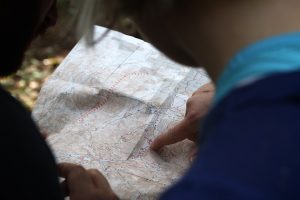JOURNAL ARTICLES: SEPTEMBER 2018
Chaplier, M., & Scott, C. (2018). Introduction: From Beavers to Land: Building on Past Debates to Unpack the Contemporary Entanglements of Algonquian Family Hunting Territories. Anthropologica, 60(1), 30-44.

Abstract
In 1986, Anthropologica published a special issue on Algonquian Family Hunting Territories (FHT) with diverse ethnographic research that overturned, grounded and reframed the earlier literature on the origins and the private-primitive communism property descriptions of Algonquian land tenure systems. The issue presented research developed with. for and in the emerging northern Indigenous political and legal struggles to continue to live on and govern their lands in the midst of rapid economic and state interventions. In this Introduction to the special issue, we provide a historical overview as well as a renewed framework for the analysis of Indigenous territoriality and governance which has been informed by the ways Algonquian peoples have continued to respond to the challenges they faced in the last thirty years. We describe the evolution of the Algonquian lives on the land and governance in the midst of resource exploitation and extraction, as well as important shifts within continually emerging Algonquian socialities.
Déry, S. (2018). Des Cent-Îles aux Cent-Géographies : pérégrinations sud-est asiatiques du géographe Rodolphe De Koninck. Cahiers de géographie du Québec, 61(173), 235–252.

Abstract
Aborder l’œuvre de Rodolphe De Koninck, géographe québécois dont la carrière couvre plus de cinq décennies, doit se faire sans prétention tellement les portes d’entrée sont nombreuses, depuis sa première publication majeure, Les Cent-Îles du Lac Saint-Pierre, parue en 1970. À partir des transformations agraires, d’une part, et de la construction des États modernes, d’autre part, l’objectif est d’examiner l’évolution de la contribution du géographe à la compréhension de ces questions, tant en Asie du Sud-Est que dans leur universalité. Considérant les enjeux actuels, liés entre autres à une transition agraire source d’inégalités et aux impacts environnementaux néfastes, il s’agit de suggérer en quoi les recherches de Rodolphe De Koninck contribuent à mieux faire comprendre ces enjeux.
Approaching the work of Rodolphe De Koninck, a geographer from Quebec whose career spans over five decades, must be done unpretentiously. Starting with his first major published work titled Les Cent-Îles du Lac Saint-Pierre (1970), there are countless ways to assess his contribution to geography. The objective of this article is to analyse the evolution of De Koninck’s contribution to the understanding of agrarian transformations and modern state-building in Southeast Asia, but also, to examine his contribution in a universal manner. This article will show how De Koninck’s research remains relevant in helping us to better understand modern issues such as how the on-going agrarian transition is a source of inequality, as well as a source of negative environmental impacts.
Scott, C. (2018). Family Territories, Community Territories: Balancing Rights and Responsibilities through Time. Anthropologica, 60(1), 90-105

Abstract
This article focuses on the somewhat neglected phenomenon of band-level territoriality and its implications for understanding the much more extensively debated family hunting territory system. The organisational levels of the family and the band are part and parcel of a customary tenure system that has endured the proliferating entanglements of fur trade history and the modern industrial period through a dynamic balancing of the rights and interests of families within those of the larger band – and more recently of the regional nation. It is through participation in larger collectivities that families’ prerogatives are recognised and reproduced
